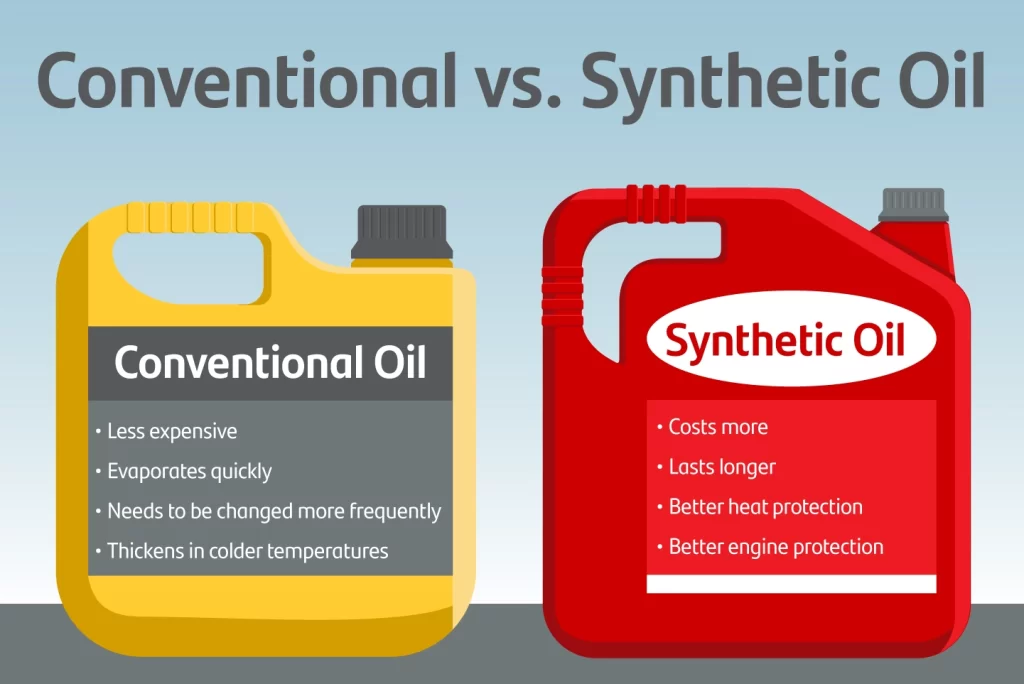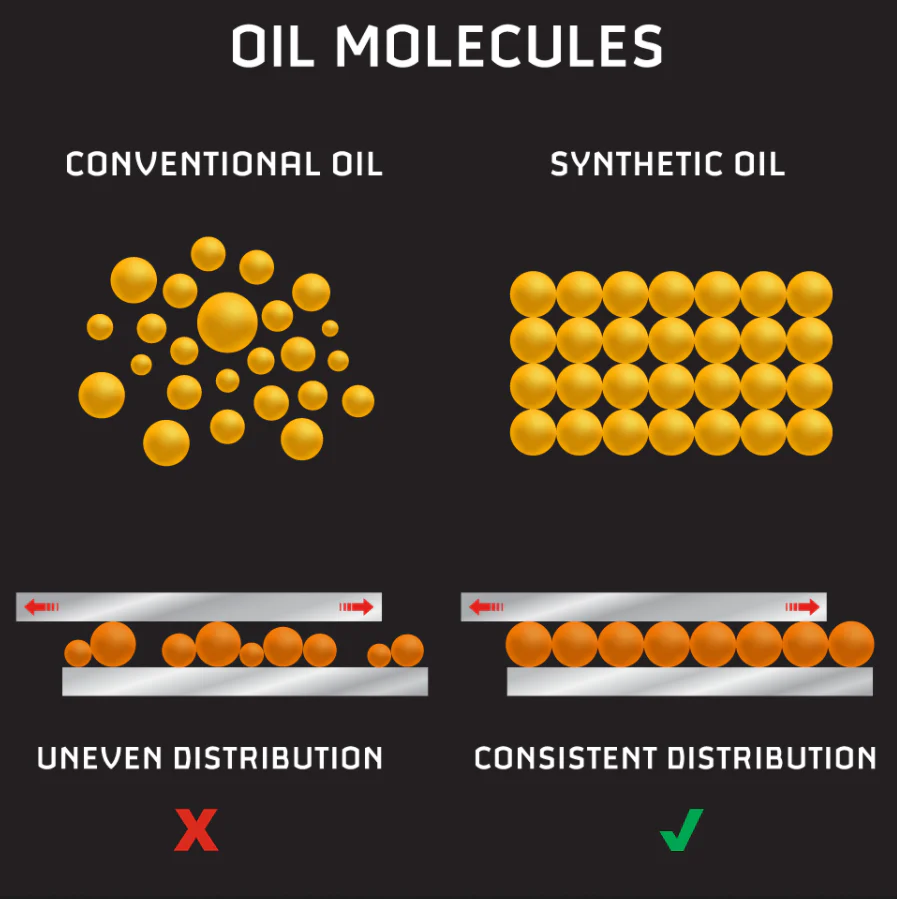When it comes to maintaining your car’s engine, choosing the right oil is crucial. The debate between regular oil and synthetic oil has left many car owners wondering which option is truly better.
In this post, we aim to clear up the confusion.
By the end of the guide, you’ll have the knowledge to make an informed decision and keep your engine running smoothly. Discover the ultimate showdown: regular oil vs. synthetic oil — which one is better?
- What Are Conventional Motor Oils?
- What Are Synthetic Motor Oils?
- Differences Between Conventional and Synthetic Oils
- What Are the Advantage and Disadvantages of Conventional Oil?
- What Are the Advantages and Disadvantages of Synthetic Oil?
- When Should You Use Conventional Motor Oils?
- When Should You Use Synthetic Motor Oils?
- Final Thoughts: Regular Oil vs. Synthetic Oil — Which One Is Better?
- Frequently Asked Questions
What Are Conventional Motor Oils?
Conventional motor oils, also known as mineral oils, are derived from crude oil through a refining process. They are the traditional and most widely used type of motor oil. Conventional oils are composed of base oil and additives to enhance their lubricating properties.
While they provide sufficient lubrication and protection for standard driving conditions, they lack some of the advanced characteristics found in synthetic oils. Conventional motor oils require more frequent oil changes due to their lower resistance to breakdown and oxidation.
They are generally less expensive compared to synthetic oils, making them a common choice for budget-conscious drivers or older vehicles that don’t require advanced oil formulations.

What Are Synthetic Motor Oils?
Synthetic motor oils are specifically engineered lubricants made from chemically synthesized compounds. Unlike conventional motor oils, synthetic oils are not derived from crude oil but are created in a controlled laboratory environment.
This allows manufacturers to tailor the molecular structure of the oil, resulting in superior performance and protection. Synthetic oils offer improved viscosity stability, better resistance to oxidation and thermal breakdown, enhanced lubrication at high temperatures, and reduced engine deposits.
They also have a longer lifespan, which means less frequent oil changes. While synthetic oils are generally more expensive than conventional oils, their advanced formulation makes them ideal for high-performance engines, extreme driving conditions, and vehicles requiring top-notch lubrication.
Differences Between Conventional and Synthetic Oils

1. Composition
Conventional oil is derived from crude oil and undergoes minimal processing. It contains a mixture of natural hydrocarbons with varying molecular sizes and impurities. This can lead to more engine deposits and less stability under extreme temperatures.
Synthetic blend oils, on the other hand, are chemically engineered to provide superior performance and protection. It is made from a precise blend of high-quality base oils and additives, resulting in a uniform molecular structure. This composition offers enhanced lubrication, reduced engine deposits, and better resistance to temperature extremes.

2. Changing Interval
Conventional oil typically requires more frequent oil changes, usually every 3,000 to 5,000 miles. The lower viscosity and additive breakdown can lead to quicker degradation and reduced performance over time.
Synthetic blends, thanks to their superior stability and resistance to breakdown, can last longer between oil changes. It can provide reliable lubrication and protection of the vehicle’s engine for extended periods, with recommended change intervals of 7,500 to 10,000 miles or more, depending on the manufacturer’s guidelines.
3. Cost
Conventional oil is generally more affordable compared to synthetic oil. Its simpler manufacturing process and lower production costs make it a budget-friendly option for regular oil changes.
Synthetic oil, however, comes at a higher price point due to its advanced formulation and superior performance. While it may be costlier upfront, its extended change intervals and superior engine protection can result in long-term savings and potentially fewer engine issues.
4. Additive Package
Conventional oil typically contains a basic additive package that provides essential protection against engine wear and oxidation. However, it may not offer the same level of advanced additives found in synthetic oils, limiting its ability to provide enhanced performance and long-term engine cleanliness.
Looking at the full synthetic oils, it is formulated with a robust additive package designed to deliver exceptional engine protection and performance. These additives can include detergents, dispersants, anti-wear agents, and antioxidants, among others. The advanced additive package in synthetic oil helps prevent sludge formation, minimize engine deposits, and ensure optimal lubrication throughout the engine’s operating range.
5. Cold Weather Performance
Conventional Oil: In colder climates, conventional oil tends to thicken, which can make it more challenging to start the engine during cold weather. Its higher viscosity and reduced flowability in low temperatures can result in increased wear during startup and reduced overall efficiency until the oil warms up.
Synthetic oil, on the other hand, exhibits superior cold-weather performance due to its lower viscosity and better flow characteristics in chilly conditions. It flows more easily at low temperatures, ensuring rapid lubrication upon startup and providing optimal protection to engine components even in extreme cold. This attribute makes synthetic oil an excellent choice for regions with harsh winters or for vehicles subjected to frequent cold starts.
Remember, when selecting between synthetic and conventional oil, it’s crucial to consider your vehicle’s requirements, manufacturer recommendations, and driving conditions. Regular oil changes using the appropriate oil type will help maintain engine health and prolong its longevity.
What Are the Advantage and Disadvantages of Conventional Oil?

Advantages
- Availability and Affordability: Conventional oil is widely available and more affordable compared to synthetic oil. It can be easily found in most automotive stores and service centers.
- Compatibility: Conventional oil is compatible with older vehicle models that may not be designed for synthetic oil. It works well with traditional engines that have standard seals and gaskets.
- Seal Swelling: Conventional oil has the advantage of causing slight swelling in seals, which can help prevent minor leaks in older engines.
- Suitable for Normal Driving Conditions: If you drive under standard conditions and follow regular maintenance schedules, conventional oil can provide adequate lubrication and protection for your engine.
Disadvantages
- Lower Performance in Extreme Conditions: Conventional oil flows slowly and tends to break down more quickly under high temperatures and extreme driving conditions. This can result in reduced lubrication and potential engine wear.
- Shorter Change Intervals: Due to its lower resistance to heat and oxidation, conventional oil typically requires more frequent oil changes compared to synthetic oil. This can increase maintenance costs and the hassle of regular servicing.
- Sludge and Deposits: Conventional oil is more prone to forming sludge and deposits over time. These can accumulate in the engine, potentially causing performance issues and reducing fuel efficiency.
- Limited Engine Protection: Conventional oil may not provide the same level of engine protection as synthetic oil. It may not flow as well at low temperatures or offer optimal lubrication for high-performance engines.
- Environmental Impact: Conventional oil is derived from crude oil, a non-renewable resource, and its production and disposal can have negative environmental impacts, including pollution and greenhouse gas emissions.
What Are the Advantages and Disadvantages of Synthetic Oil?

Advantages
- Improved Engine Protection: Synthetic oil offers superior lubrication, reducing friction and wear on engine components. It provides better protection against heat, oxidation, and sludge formation, ensuring the longevity and efficiency of the engine.
- Extended Oil Change Intervals: Synthetic oil can last longer between oil changes compared to conventional oil. It has a higher resistance to breakdown, maintaining its performance and viscosity over a more extended period. This can result in cost savings and convenience for vehicle owners.
- Enhanced Performance in Extreme Conditions: Synthetic oil performs exceptionally well in extreme temperatures, both hot and cold. It remains stable and flows smoothly, ensuring optimal engine performance in harsh weather conditions or during demanding driving situations.
- Fuel Efficiency: Due to its superior lubricating properties, synthetic oil can help improve fuel efficiency. It reduces internal friction, allowing the engine to operate more smoothly, and potentially leading to better mileage.
Disadvantages
- Higher Cost: Synthetic oil is generally more expensive than conventional oil. The advanced manufacturing processes and superior performance contribute to its higher price tag. However, the extended oil change intervals can offset some of the cost difference.
- Seal Compatibility: Synthetic oil has a different chemical composition compared to conventional oil, which may not be compatible with certain older engine seals and gaskets. It’s important to check the manufacturer’s recommendations and ensure compatibility before using synthetic oil.
- Environmental Impact: Synthetic oil is typically produced using a combination of chemically modified petroleum compounds and additives. The production process and disposal of synthetic oil can have environmental implications. However, some synthetic oils are formulated to be more eco-friendly.
- Potential Oil Leaks: Synthetic oil’s thinner consistency and higher detergent properties may cause it to find and expose existing leaks or weak seals in older engines. Regular maintenance and inspection can help mitigate this issue.
When Should You Use Conventional Motor Oils?
Conventional motor oils are a suitable choice in specific situations where their characteristics align with the needs of the vehicle. If you have an older vehicle that is not designed to handle synthetic oils, conventional oils can be a reliable option.
Additionally, if you typically drive under normal conditions without extreme temperatures or heavy loads, conventional oils can provide adequate lubrication and protection. Cost considerations may also come into play, as conventional oils are generally more affordable than synthetic oils, making them a practical choice for those on a tight budget.
However, it’s important to note that conventional oils often require shorter change intervals compared to synthetic oils, so if you prefer more frequent oil changes, conventional oils may be preferred. To make an informed decision, consult your vehicle’s manual and consider your specific driving conditions and requirements.
When Should You Use Synthetic Motor Oils?
Synthetic motor oils are highly recommended for specific circumstances where their advanced properties offer distinct advantages. If you drive a newer vehicle with a high-performance engine or turbocharged system, synthetic oils provide superior protection and lubrication.

They are also ideal for extreme driving conditions, such as severe temperatures or heavy loads, as they maintain stability and performance under challenging circumstances. Synthetic oils have a longer lifespan and can handle extended change intervals, reducing maintenance frequency.
Furthermore, they exhibit better resistance to oxidation, sludge formation, and viscosity breakdown. Although synthetic oils are generally pricier than conventional oils, their benefits in terms of engine protection and longevity make them a valuable choice for many drivers. Always consult your vehicle’s manual for specific oil recommendations.
Final Thoughts: Regular Oil vs. Synthetic Oil — Which One Is Better?
In conclusion, the debate between regular oil and synthetic oil has been a long-standing one in the automotive world. While regular oil offers affordability and widespread availability, synthetic oil provides superior performance, protection, and extended oil change intervals.
Ultimately, the choice between the two depends on your specific vehicle, driving habits, and budget. Consider the recommendations of your vehicle manufacturer and consult with a trusted mechanic to determine the best oil for your car’s needs. Make an informed decision and enjoy optimal engine performance and longevity.
Explore our blog on engine oils to find more similar information.



